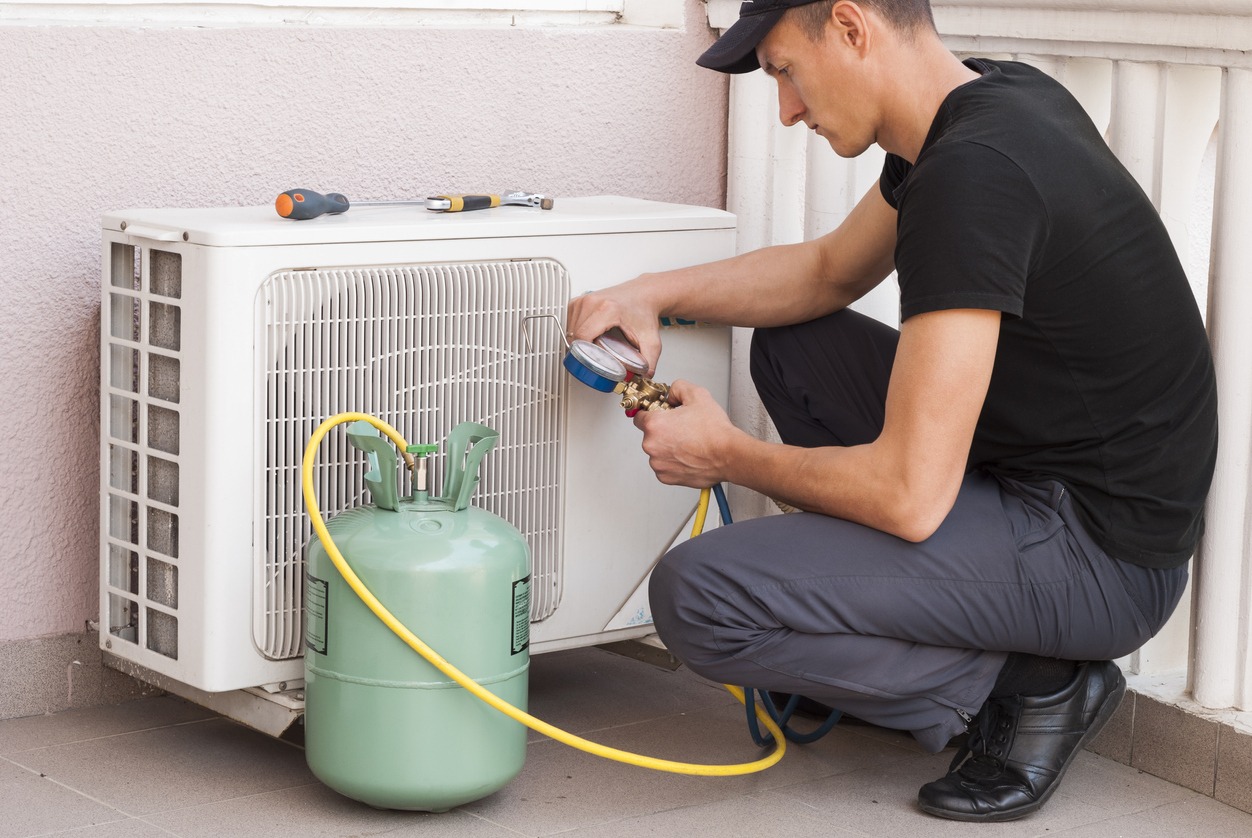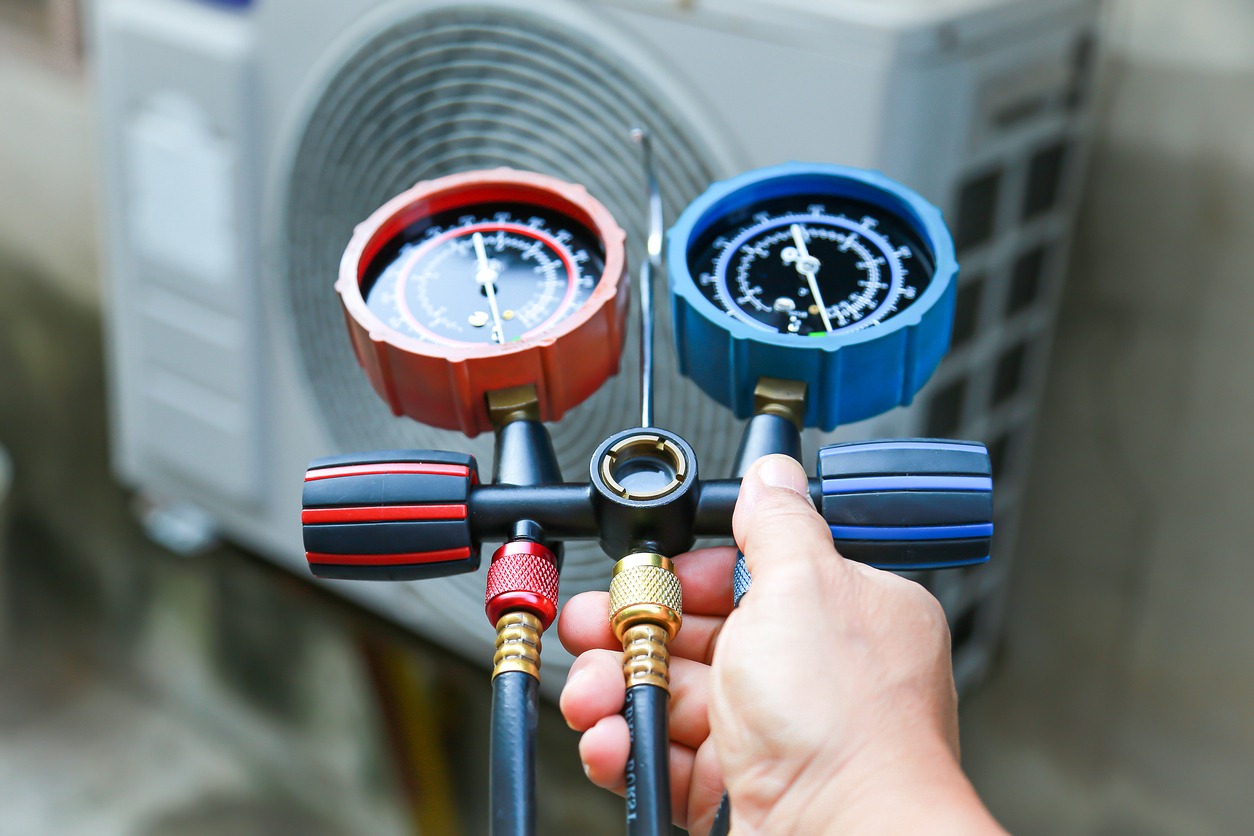Air conditioning systems are essential for maintaining comfort in our homes and workplaces, especially during the sweltering summer months. However, an AC unit low on refrigerant can lead to a host of problems, compromising its efficiency and cooling power. Recognizing the signs of low refrigerant early can save you from discomfort, prevent costly repairs, and ensure your system operates at peak performance. This article will guide you through the common indicators that your air conditioner may be running low on this crucial fluid, helping you to identify potential issues before they escalate. Whether you’re a homeowner or manage a commercial property, understanding these symptoms is key to maintaining a cool and comfortable environment.
Identifying Low Refrigerant in Your AC: Key Symptoms
A well-functioning air conditioning system relies on an adequate supply of refrigerant, a crucial component that enables the cooling cycle. Unlike a vehicle’s gasoline consumption, refrigerant operates within a sealed system and should not diminish over time. Consequently, if you find the refrigerant levels are dwindling, it’s often an indication of a leak or a malfunction within the system. Early detection of these signs can save your AC from further damage and keep your living environment both comfortable and cost-effective. We will delve into the most common indicators that suggest your AC might be running low on refrigerant, equipping you with the knowledge to tackle the problem swiftly.
Warm Air Emitting from Vents
A telltale sign that your AC may be suffering from low refrigerant is the emission of warm air from your vents, a stark contrast to the cool air you expect. Under typical conditions, the refrigerant’s role is to absorb indoor heat and expel it outdoors, thus chilling the air recirculated into your home. A shortage of refrigerant disrupts this heat exchange, leading to a noticeable decline in cooling efficiency.
You might experience a gradual or sudden onset of warmer air during periods when your AC is most needed. This not only affects your immediate comfort but also signals that your system isn’t performing as it should. While a warm breeze from your vents could stem from other issues, such as incorrect thermostat settings or a clogged filter, if these factors have been eliminated, a low refrigerant level could be the underlying issue. Without an adequate refrigerant charge, your AC will struggle to provide the crisp, cool air you desire, resulting in a less than satisfactory cooling experience.
Ice Buildup on the AC Unit
Discovering frost or ice on your air conditioner’s components can be perplexing, given its role in providing cool comfort rather than icy surfaces. Yet, this paradoxical situation often points to a deficiency in refrigerant. The refrigerant’s job is to absorb heat while circulating at a certain pressure. A drop in refrigerant levels leads to a pressure decrease and a subsequent dip in temperature within the coils.
This abnormal chill causes the air’s moisture, which typically condenses and drips off the coils, to freeze, creating an insulating barrier of ice. This not only hampers the system’s ability to absorb heat but also risks damage to the coils and restricts airflow, both of which can compromise the unit’s effectiveness.
To discern whether you’re dealing with a simple case of condensation or a more serious ice buildup, inspect your AC unit for frost or ice when you observe a decline in cooling performance. Upon noticing such signs, it’s imperative to switch off the AC to avert additional harm and seek professional assistance. Overlooking this issue can escalate to a total system failure.
Unusual Noises: Hissing or Bubbling
When your AC whispers secrets of malfunction through hissing or bubbling sounds, it’s time to listen closely. These auditory clues often signify a refrigerant leak, which can be detrimental to your system’s health. A hissing sound typically emerges when the refrigerant, under high pressure, finds a way out through tiny fissures in the coils or lines. This sound can be quite subtle, yet perceptible even from a distance.
Conversely, a bubbling noise suggests a more substantial leak or one involving liquid refrigerant. Such leaks can allow air and moisture to infiltrate the system, leading to the formation of bubbles and the distinctive gurgling as they traverse the refrigerant lines.
These sounds are harbingers of an active leak that not only depletes refrigerant but also risks contaminating the system, potentially causing further damage to AC components and diminishing efficiency. Disregarding these auditory warnings can precipitate a more severe and expensive system failure. Prompt intervention by an HVAC specialist is crucial to identify and mend the leak and to restore the refrigerant to its correct level.
Spike in Energy Bills
A sudden surge in your utility expenses during peak AC usage months could point to an undercharged air conditioning system. Insufficient refrigerant hampers the heat exchange process, compelling the unit to operate for extended durations to cool your home. This inefficiency translates into a noticeable uptick in energy consumption.
The escalation in power usage may manifest subtly or strikingly, contingent upon how swiftly the refrigerant is depleting. Should there be no other discernible reasons for the increased costs, such as a spike in electricity rates or a heatwave, it’s prudent to consider the possibility of a refrigerant shortfall.
Beyond the financial impact, a leak can have detrimental effects on the environment and the integrity of your AC system. Proactive intervention by a certified HVAC specialist can not only recalibrate your system’s efficiency but also preempt more severe complications that could necessitate costly repairs or even a full system replacement.
Inconsistent Cooling and Long Cycle Times
Fluctuating temperatures and protracted operation times are hallmark indicators of a refrigerant deficit in your air conditioning system. A fully charged system circulates refrigerant to extract indoor warmth and expel it outside, but when levels are low, this process falters, resulting in a home with unevenly cooled spaces.
Additionally, the system may persist in its efforts to reach the set temperature, thereby extending its cycle times. This not only leads to discomfort but also places additional strain on the AC unit, potentially accelerating the wear on its components.
These signs, coupled with the aforementioned energy consumption concerns, underscore the need for prompt attention to your AC unit. Should you observe that your system is laboring to maintain uniform temperatures, or if it’s running for unusually prolonged intervals, it’s advisable to consult with an HVAC expert to diagnose and rectify any refrigerant-related issues.
Automatic System Shutdown or Non-Engaging Clutch
If your air conditioning system suddenly ceases operation or the compressor’s clutch fails to engage, it could be a red flag signaling insufficient refrigerant. Advanced AC units are outfitted with pressure sensors that vigilantly track refrigerant pressure, safeguarding the system against the detrimental effects of running with depleted levels, such as compressor overheating or damage.
A precipitous decline in refrigerant may prompt these sensors to initiate a protective shutdown, halting operation to prevent further harm. In the case of central air systems, a compressor clutch that remains disengaged is often a telltale sign of inadequate pressure—a necessary precaution to avoid compressor damage.
Should you find your AC unresponsive or the exterior unit inactive during a cooling cycle, it’s crucial to resist the urge to force it back into action or to reset it continuously. Such actions could exacerbate the issue. At this juncture, the expertise of a certified HVAC technician is indispensable. They can conduct a thorough assessment and address the underlying cause, ensuring your system returns to optimal functionality without incurring additional damage.
Visible Leaks or Pooled Fluid
Detecting a refrigerant leak might be challenging due to its propensity to vaporize swiftly into the atmosphere. However, certain signs can betray its presence, such as an oily sheen on the refrigerant lines or coils of your AC unit—a telltale residue indicative of a leak.
During inspections or maintenance, HVAC professionals may introduce a specialized dye into the system to render leaks more conspicuous. Should you come across any unusual substances or accumulations of fluid beneath your air conditioning unit, it’s possible that this dye is highlighting a leak.
Moreover, as previously mentioned, a leak can cause the evaporator coils to freeze, which, upon thawing, results in an unusual amount of water near the indoor unit. This is distinct from the typical condensation your AC system produces. An unexpected increase in water or the appearance of an oily substance near your unit should prompt immediate action.
Given the hazardous nature of refrigerant, it’s imperative to avoid direct contact with these substances. Instead, enlist the services of a trained HVAC technician to manage the leak. Their expertise ensures that the refrigerant is handled correctly and that your system is restored to its full, safe operational state.
Musty Odors and Air Quality Concerns
Encountering a persistent musty scent when your air conditioner is in use can be indicative of a deeper issue than just unpleasant smells—it may suggest your system is running low on refrigerant. The role of refrigerant in extracting humidity from the air is pivotal; it condenses water vapor, which is then expelled from the system. A shortfall in refrigerant hampers this process, leaving excess moisture to linger in the air and on internal components. This moist setting is a prime habitat for mold and mildew to flourish, which are the culprits behind those musty odors.
Beyond the discomfort of a malodorous home, these conditions can pose a threat to health. The proliferation of mold spores and mildew through your ductwork can compromise indoor air quality, potentially triggering allergies and respiratory problems. Should a musty aroma persist, it’s advisable to consider a refrigerant leak or similar issue as a potential cause. Prompt intervention by an HVAC specialist is crucial not only to eliminate the odor but also to ensure your system is optimally charged with refrigerant, safeguarding your home’s air quality and your well-being.
Thermostat Reading Inaccuracies
Discrepancies between your thermostat’s display and the actual room temperature could be a subtle hint that your air conditioning system is not fully charged with refrigerant. An inadequately cooled space, despite a thermostat set to chill, often points to a system struggling to meet its cooling obligations. While it’s easy to suspect a faulty thermostat, especially when the indoor temperature stubbornly refuses to align with your preferred setting, the real culprit may be a depleted refrigerant supply.
Consider a scenario where you’ve dialed in a comfortable 72 degrees on a sweltering day, yet the relief of cool air remains elusive. This mismatch can be particularly noticeable during heatwaves when your AC is under the most strain. If your cooling system labors continuously without reaching the set temperature, or if it takes an inordinate amount of time for the indoor climate to reflect your thermostat’s setting, it’s time to consult with an HVAC expert. Early detection and resolution of refrigerant issues can avert further system inefficiencies and protect against extensive damage to critical components like the compressor.
Excess Moisture or Water Damage
When your air conditioning system starts to resemble a miniature indoor pool, it’s a telltale sign that something’s amiss. Often, this symptom points to a scarcity of refrigerant. The connection is straightforward: insufficient refrigerant leads to the freezing of the evaporator coils, a phenomenon we’ve touched on in the context of ice accumulation. Once the ice thaws, the resulting deluge may overwhelm the drainage capacity, leaving you with puddles where they shouldn’t be and the potential for water damage to your property’s infrastructure.
A certain degree of condensation is typical for air conditioners, particularly in areas with high humidity. However, when moisture accumulation escalates to the point of causing water damage, it’s a clear signal that intervention is necessary. Beyond the refrigerant issue, the risk of mold proliferation and the ensuing structural compromise is a pressing concern.
Vigilance is key. Homeowners should be on the lookout for any unusual wetness or staining in the vicinity of their AC systems. Encountering such signs should prompt a call to an HVAC specialist, who can determine whether the moisture is a byproduct of a refrigerant shortage and freezing cycles, or if there’s another culprit, such as a clogged condensate line.
Short Cycling: Frequent On and Off
If your air conditioner is behaving like a temperamental light switch, flickering on and off more often than it should, it’s likely experiencing short cycling. This erratic behavior can indicate a refrigerant deficit. With inadequate refrigerant, the air conditioner may initiate the cooling process but then abruptly cease operation as it fails to maintain necessary pressure levels, triggering the system’s pressure sensors.
The repercussions of short cycling are manifold. It accelerates wear on components, especially the compressor, and can inflate your energy bills—a subject we’ve previously explored. Moreover, it can diminish the overall lifespan of your AC and compromise your indoor humidity control, which can lead to a less comfortable environment and potential air quality issues.
Observing short cycling warrants immediate action. Without timely intervention, the problem can escalate, resulting in more extensive and expensive repairs. An HVAC technician should be consulted to investigate for leaks or other factors that could be causing the refrigerant to deplete, ensuring your air conditioning system returns to its optimal state of cooling efficiency.
Maintenance and Performance Checks
To avert the complications associated with low refrigerant levels, proactive maintenance and performance evaluations are essential. These preventative measures not only ensure peak operation of your AC system but also aid in the early detection of wear or potential leaks that could precipitate a loss of refrigerant.
When HVAC experts conduct performance checks, they typically undertake a thorough inspection that encompasses cleaning the coils, verifying refrigerant pressure, calibrating the thermostat, scrutinizing the ductwork for leaks, evaluating electrical components, and confirming that the condensate drain is unobstructed.
A critical part of maintenance is the leak test. Since refrigerant circulates in a sealed system, it should not deplete over time. Therefore, the necessity for a refrigerant recharge signals a leak that must be located and rectified. Overlooking such indicators can escalate into more severe issues, including compressor damage or inefficient cooling, which can inflate energy expenses and lead to system malfunctions.
Engaging in regular preventative maintenance is the cornerstone of prolonging your AC unit’s lifespan, preserving indoor air quality, and managing energy usage. It’s advisable for homeowners to arrange for professional inspections annually, optimally before the onset of the cooling season, to guarantee their systems are primed to deliver efficient and reliable cooling when temperatures rise.
Useful FAQs for Troubleshooting If Your AC is Low on Refrigerant
1. What are common indicators of refrigerant deficiency in an AC unit?
Common signs include its inability to cool spaces effectively, large electricity bills, ice buildup on the outdoor unit, a constantly running AC, and a hissing noise indicating a refrigerant leak.
2. How is excessive utility billing linked to AC’s low refrigerant levels?
An AC unit requires sufficient refrigerant to cool effectively. Low refrigerant leads to an overworked AC, consuming more electricity and resulting in high energy bills.
3. Can ice buildup on the outdoor unit signify a low refrigerant problem?
Yes. When refrigerant levels drop, the evaporator coil’s temperature can fall below freezing, causing condensation to freeze and ice to build on the outdoor unit.
4. Does a continuously running AC imply a lack of refrigerant?
Yes. When the AC lacks enough refrigerant, the unit cannot cool the air noticeablely, causing the system to work overtime to reach the set temperature and not shut off as usual.
5. How is a hissing noise connected to low refrigerant levels in the AC?
A hissing sound may indicate a refrigerant leak. As the refrigerant escapes through a hole or crack, air mixes with the refrigerant, creating the hissing noise.
6. Can an ineffective cooling performance signal refrigerant deficiency?
Absolutely. When the refrigerant is low, the AC unit cannot adequately cool the air, making indoor spaces warmer than what the thermostat setting indicates.


